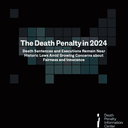
Oklahoma recently filed a petition with a federal court asking that pentobarbital, an anesthetic agent used in euthanasia of animals, be allowed as a substitute for sodium thiopental in lethal injection procedures. Earlier this year, Hospira Inc., the nation’s sole manufacturer of the latter drug, announced that it has ceased production because of a shortage in one of the ingredients. The shortage has forced Oklahoma and other states to delay executions and seek other sources for the drug. Attorneys for John David Duty, who is scheduled for execution in Oklahoma in December, raised questions about the new drug, asserting that at this point the drug “is untested, potentially dangerous, and could well result in a torturous execution.” Efforts to obtain sodium thiopental from other sources have initiated legal battles around the country. Some experts believe that inmates are at a greater risk of suffering severe pain during executions if states use imported or unproven drugs. A foreign supply of thiopental could be less powerful than the domestic variety. Defense lawyers also contend prison officials might not use proper care in transporting the drug, potentially exposing it, for example, to temperature extremes that could hurt its effectiveness. Oklahoma City federal judge Stephen Friot is expected to hear arguments next week. If approved, pentobarbital could be a new standard for lethal injections around the country. Dr. A. Jay Chapman, the former medical examiner of Oklahoma who recommended thiopental in the 1970s as a suitable drug for lethal injections recently expressed a lack of concern about whether the drug worked as originally claimed: “If they (inmates being executed) have a bit of pain exiting this world, it is of no great concern to me.”
(N. Koppel, “Plea for Execution Drug,” The Wall Street Journal, November 9, 2010). See Lethal Injection.



